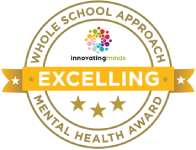Our Curriculum

A Coherent and Relevant Curriculum to Prepare Our Pupils for the Future
The Curriculum is mapped from the reception class to the year 6 class, and elements of knowledge and skills are carefully sequenced in every curriculum subject.
The process of curriculum sequencing plans out the skills (procedural knowledge), knowledge (declarative knowledge) and content across our school curriculum so that what children learn builds on what they've known before.
A coherent curriculum follows a logical progression. Attention is paid to the order in which knowledge, in whatever form that might take, should be introduced and revisited.
The Curriculum in many subjects depends on a deliberate approach to what will come next.
Effective sequencing will also embellish and unify what may seem like disconnected fragments of knowledge. To create a sense of coherence for our discipline, teachers ask: Why this? Why now?
Working memory is limited, so we must sequence our Curriculum by drawing on prior knowledge and logically sequencing learning episodes. Hence, they accumulate in small stages, securing understanding at one stage before moving on to the next.
When returning to crucial knowledge, we revisit and dig deeper than simple retrieval: we need to explicitly draw attention to where we have seen this vocabulary, concept, behaviour or pattern before and expose its relationship to what we are teaching now.
The Role of Memory in the Learning Process:
Memory plays a crucial role in the learning process. It enables us to encode, store, and retrieve learned information.
There are various types of memory, including working, short-term, and long-term. Working memory holds information being processed, while short-term memory stores information for a brief period, usually less than a minute. Long-term memory retains data for an extended duration, potentially a lifetime.
Several factors, including attention, motivation, and repetition, influence the retention of learned information. Concentration involves focusing on the information to be learned, while motivation affects the level of interest in the material. Repetition strengthens the connections between neurons involved in memory storage, leading to better retention.
In conclusion, memory plays a crucial role in the learning process. The encoding, storage, and retrieval of information are essential to effective learning. Understanding the different types of memory and the factors influencing memory retention can help individuals improve their learning outcomes.
Strategies for Effective Learning:
We teach our pupils various styles and strategies for learners to comprehend and recall new material effectively. These strategies promote the development of critical thinking and reasoning skills essential to success in education and beyond. Examples of cognitive skills include active discussion, the use of learning tools, and problem-solving.
Effective cognitive strategies include identifying and organising relevant information, summarising key points, and self-testing to ensure understanding and recall. Active discussion is another method that promotes cognitive learning by encouraging learners to engage in dialogue and reflection with their peers.
Cognitive strategies benefit students by fostering profound understanding, improving retention, and enhancing problem-solving abilities. Learners who utilise cognitive techniques are better equipped to process complex information, creating a more immersive and enjoyable learning experience.
The ongoing training of our teaching staff is focused on developing pupils' cognitive skills as essential for successfully retaining and applying new concepts. Cognitive strategies such as active discussion, summary techniques, and self-testing are practical tools that promote effective learning. By incorporating these techniques, learners can enhance their critical thinking and reasoning abilities, leading to more excellent academic and professional success.
Examination Preparation:
HPS has an excellent academic reputation and an enviable success rate for Local Authority Grammar and Independent Grammar schools. Our carefully designed Curriculum naturally prepares children for any examination at the end of juniors. In addition to daily mathematics and English lessons, the children in year five also receive two verbal reasoning lessons and two non-verbal reasoning lessons each week. During the summer of year 5, those members of staff who have taught the children during the academic year offer summer classes at no additional cost. This gives the children valuable revision and examination practice, giving them the best opportunity to do well in the entrance examinations. The Local Authority entrance examinations are taken in the first week of September.



